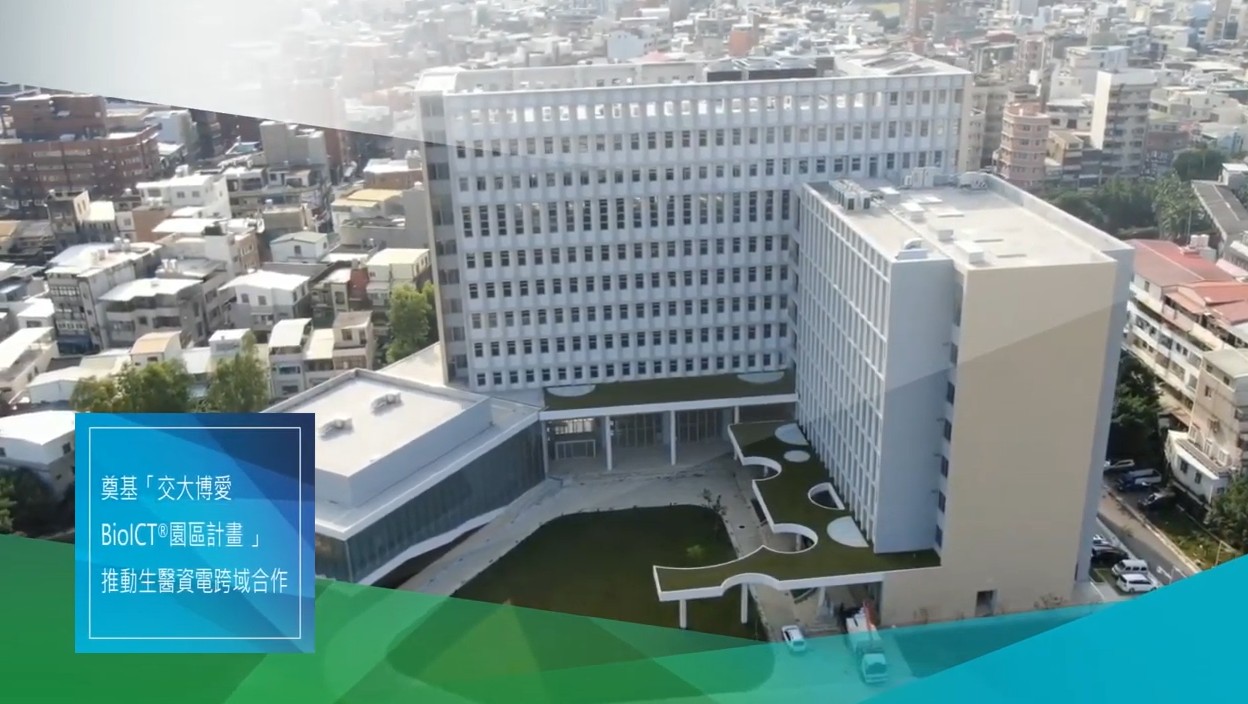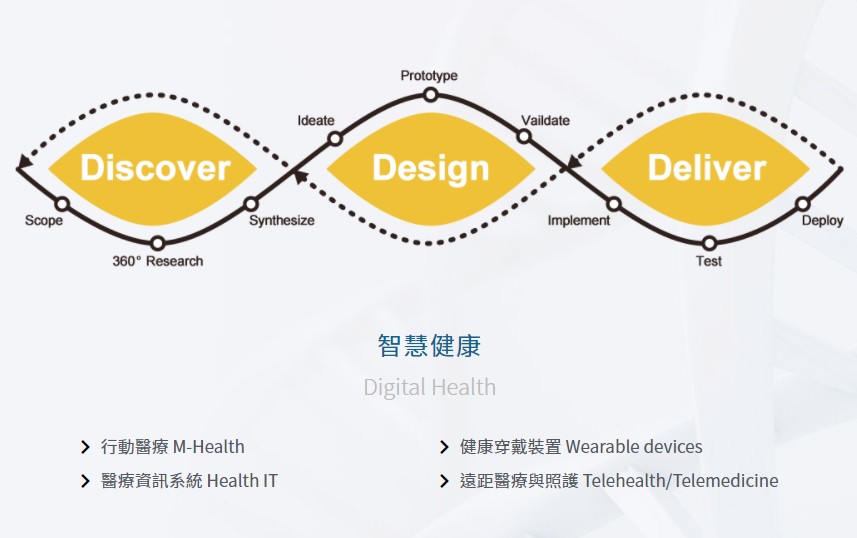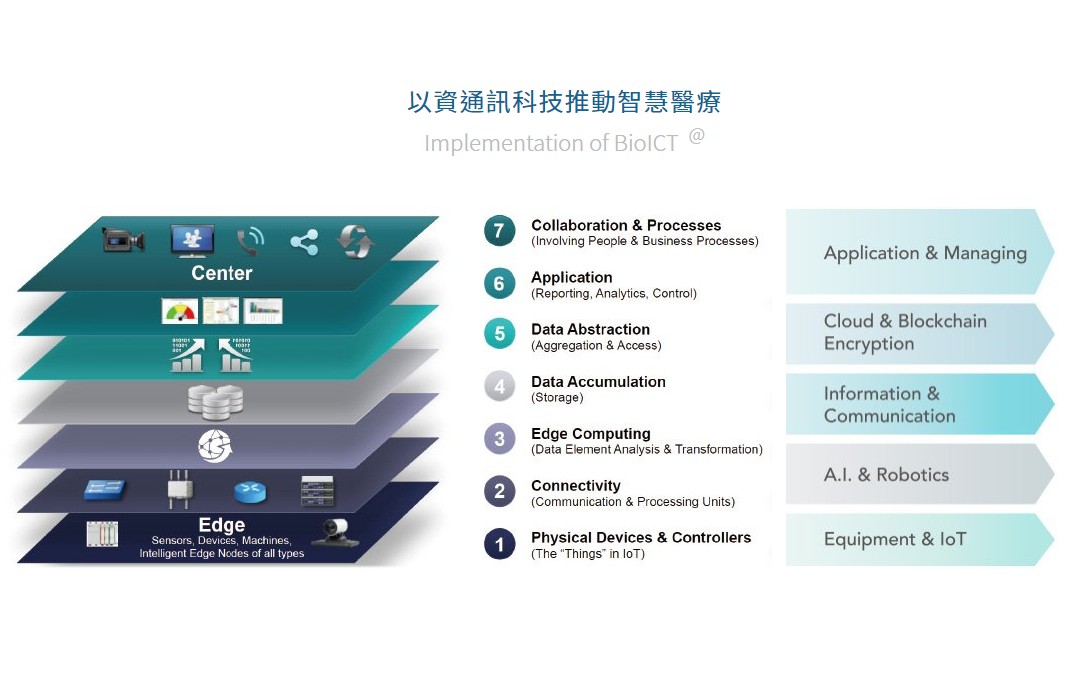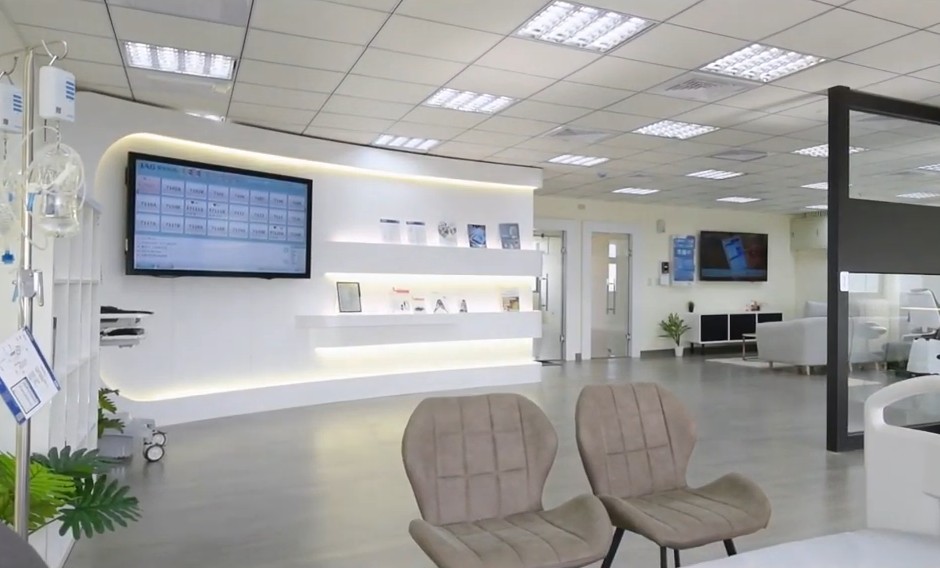President Steve Guo of National Yang-Ming University (NYMU) began planning for the future development of the university when he took office in October 2017. He actively discussed with experts and scholars in various fields, hoping to complete the integration of AI and digital medicine and consider establishing a smart healthcare research and development center.
President Frank Chang of National Chiao Tung University (NCTU) established the "Smart Healthcare Promotion Office" in 2017. The office integrates the energy and achievements of various colleges, research centers, and domestic and foreign cooperative units in the field of smart healthcare and mediates relevant industry cooperation.
In line with the school's medium and long-term development plans and the national demand for medical care, National Chiao Tung University (NCTU) plans to establish the NCTU Boai BioICT Park in the Boai campus, with a development vision to effectively promote the development and growth of the domestic smart healthcare industry through the cluster effect generated by hospitals, universities, research centers, and manufacturers, with a focus on integrating clinical and biomedical technology development.The establishment of a smart hospital in the Boai campus in Hsinchu is an important starting point to achieve this goal, as well as an important platform for collaboration among relevant universities, research centers, and manufacturers. The planning for the NCTU Smart Hospital began in 2015, and the construction was approved by the Ministry of Education and the Ministry of Health and Welfare in 2018 and 2019, respectively, with funding from two NCTU alumni. The establishment and operation of the hospital will be entrusted to the Chu-Ming Foundation, a medical foundation established by NCTU alumni donations.
When Prof. Chen-Huan Chen became the dean of the College of Medicine at National Yang-Ming University in August 2018, he contemplated the future of the school and actively sought support from Mr. Yin Yan-liang to establish a smart medical research and development center as a key focus of Yang-Ming's future development. This idea coincided with the thinking of President Steve Kuo, who appointed Vice President Hsieh Jen-chun, who took office in August 2018, to plan the establishment of the smart medical R&D center. Vice President Hsieh actively visited experts and scholars inside and outside the school to plan the prospects of combining AI and medicine at National Yang-Ming University, hoping to make it a distinctive field. He then invited Professor Terry B.J. Kuo, who was the Director of the Institute of Medical Informatics at Taipei Medical University at the time, to participate in the planning of the "Ten-Year Development Plan for the School of Medicine at National Yang-Ming University" and to design the blueprint for the "Smart Medical R&D Center."

In 2019, the Smart Healthcare Promotion Office at NCTU was reorganized into the "Smart Healthcare Promotion Center", led by Prof. Chi-Hung Lin. The center integrates the resources and achievements of various colleges, research centers, and domestic and foreign cooperative units in the field of smart healthcare. By utilizing advanced biomedical and information technology and the BioICT field at the Boai campus, the center facilitates collaboration with related industries to establish a biomedical talent cultivation environment that meets the needs of Taiwan. Through translational energy, it drives the clustering effect of smart healthcare, promotes a new integration of "ICT-biomedical engineering-clinical application," and enhances the international visibility of outstanding research and development capabilities in medical technology.
In February 2019, Professor Terry B.J. Kuo returned to the School of Medicine at National Yang-Ming University to continue preparations and planning for the center, as well as to consider how to establish the center's organizational structure. During this period, he continuously consulted with experts from within and outside the university and the medical field, exchanged ideas on the center's planning, and invited experts and scholars to serve as founding members and special demonstration sites after the center was established. At the same time, a talent database and demonstration site database were established for the center. At this point, the center's structure was clearly classified into five categories: research and development, talent cultivation, industry-academia collaboration, exchange platform, and core hardware infrastructure. The center was named "Digital Medicine Center" and was approved by the university on March 20, 2019. Professor Kuo was appointed as the first director of the center.

The mission of the Smart Healthcare Promotion Center at the NCTU is to integrate smart healthcare technologies within the campus, promote research and development capabilities and achievements, and assist in matching technologies and achievements with medical institutions and industries both domestically and internationally. Through collaboration with the campus incubation center and industry accelerator center for international linkage, the center hopes to apply achievements in the field of smart healthcare.Starting in 2019, under the leadership of Director Chi-Hung Lin, the Smart Healthcare Promotion Center has established collaborative projects with various medical centers in Taiwan, focusing on innovation and breakthroughs in artificial intelligence, wearable smart medical devices, and advanced medical technology, and continuously integrating big data from imaging, physiology, genetics, and medical records to develop precision medicine.
In August 2019, Professor Albert C. Yang returned from Harvard Medical School to teach at the Institute of Brain Science of National Yang-Ming University. Professor Yang is a Yu-Shan Young Scholar and a board-certified psychiatrist. In addition to his clinical work, he specializes in the analysis of physiological signals and the application of digital medicine. He is the only scholar from Taiwan on the editorial board of the Nature journal npj Digital Medicine. Starting in August 2019, Professor Yang became the CEO of the Digital Medicine Center, working with Professor Terry B.J. Kuo, the center's director, and Professor Jun-Ying Wu, the center's deputy director, to plan the center's research and operation directions.
In 2020, Professor Chi-Hung Lin established a simulation ward on the 10th floor of the BioICT Building at the Bo-Ai Campus in Hsinchu. He also planned for the development of a smart hospital by adjusting the configuration of the area and providing a practical field for the development of technologies and medical materials that are currently under development, ensuring that clinical needs are fully understood.As a demonstration site for smart healthcare, the simulation ward aims to establish a medical information system that provides various types of data uploading, storage, and access, allowing the research and development of smart healthcare to be tested on site. Upon completion of the tests, the system can be linked to the hospital-side system.The hardware equipment in the simulation ward has the flexibility of being easily moved and assembled. It includes waiting rooms, consultation rooms, wards, operating rooms, and hemodialysis rooms for various medical specialties. The platform is open to vendors and start-up teams to facilitate collaboration opportunities, cross-domain integration for creating business opportunities, alliance with strategic partners, and the development of smart healthcare and channels.
Under the leadership of Professor Albert Yang, the Digital Medicine Center has established the information infrastructure for a cloud-based artificial intelligence platform. They have completed the basic construction of web, computing, and data servers and hired information engineers to introduce front-end and back-end development techniques. Their team developed the "Smart Brain Imaging Platform" using big data from magnetic resonance imaging and innovative interpretable deep learning methods, which won the 2019 Ministry of Science and Technology Future Technology Breakthrough Award and the Best Popularity Technology Award at the Future Technology Exhibition. In 2020, they further received the National Innovation Award. Professor Yang also integrated the brain medicine team to receive funding from the Ministry of Science and Technology's Clinical Database AI Project, deeply cultivating the application of artificial intelligence in brain medicine.Starting in December 2020, Professor Terry B.J. Kuo was seconded to the Taoyuan Psychiatric Center of the Ministry of Health and Welfare as the Director of the Clinical Research Center. After being appointed by President Steve Guo, Professor Albert Yang become the second director and continued to lead the Digital Medicine Center, working closely with the NCTU Smart Healthcare Promotion Center to promote smart healthcare-related businesses.


On February 1, 2021, National Yang-Ming University and National Chiao Tung University merged to become the newly established National Yang Ming Chiao Tung University. On March 1, 2021, Professor Albert Yang was appointed as the director of the Smart Healthcare Promotion Center at the Chiao Tung campus and was tasked with promoting the integration of the Digital Medicine Center at Yang-Ming campus and the Smart Healthcare Promotion Center at Chiao Tung campus into the "Digital Medicine and Smart Healthcare Research Center." The integrated center combines the clinical expertise of Yang-Ming campus and the research and development capabilities of the electrical and computer engineering departments at Chiao Tung campus, with a focus on patient safety, cloud-based AI, smart sensors, and ethical regulations as the direction for promoting smart healthcare after the merger, with the goal of establishing a leading international smart healthcare research and development center.
